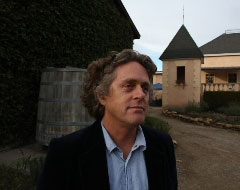October 27, 2017
Christopher Newfield to speak on the public university on Thursday, Nov 2

On Thursday, Nov. 2, Christopher Newfield will offer a public talk on "What Do Universities Do?: Paths Out of the Continuing Crisis" at 4 p.m. in the Ekdahl Conference Room, third floor, Seaton Hall.
Newfield's talk is sponsored by the English department and its graduate track in cultural studies.
Newfield is professor of literature and American studies at the University of California, Santa Barbara. Much of his research is in Critical University Studies, which links his enduring concern with humanities teaching to the study of how higher education continues to be re-shaped by social and economic forces.
Newfield's books on this subject include "Unmaking the Public University: The Forty Year Assault on the Middle Class" (Harvard University Press, 2008) and "Ivy and Industry: Business and the Making of the American University, 1880-1980" (Duke University Press, 2003).
His most recent book, "The Great Mistake: How We Wrecked Public Universities and How We Can Fix Them" (Johns Hopkins University Press, 2016) addresses the post-2008 struggles of public universities to rebuild their social missions. Its argument will serve as the focus for his talk.
Newfield blogs on higher education policy at Remaking the University, and he writes for the Huffington Post, Inside Higher Ed, The Chronicle of Higher Education, WonkHE (UK) and the Los Angeles Review of Books. He teaches courses in Detective Fiction, Noir California, Contemporary U.S. Literature, Innovation Theory, and English Majoring After College. Newfield's current research, "Limits of the Numerical," studies the effects of learning and research measurement on higher education and has been awarded a two-year National Endowment for the Humanities Collaborative Research Grant.
Tanya Gonzalez, professor of English and director of the program in cultural studies, is looking forward to hearing Newfield offer strategies for change.
"In an era of increasing privatization of public universities, Newfield uses the history of education policy to illustrate the paths that brought us to this point," Gonzalez said. "He asserts that our current situation of scarce institutional resources, crippling student debt, and increasingly limited access to higher education does not have to be the final chapter of publicly funded higher learning."
Greg Eiselein, professor of English and director of K-State First, concurs.
"Professor Newfield has identified the causes of our fiscal and pedagogical crisis and laid out a necessary and achievable plan for recovery," Eiselein said. "His recent book is a powerful reminder that the most important benefits of higher education are not private economic gains but public goods that are both economic and social."
